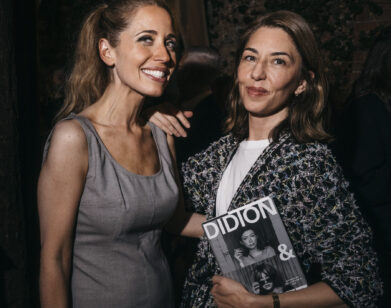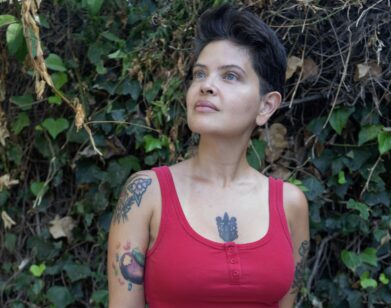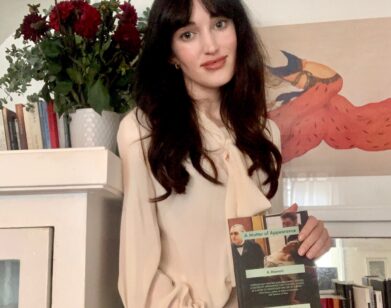Texting With Sleater-Kinney About Joan Didion, Emojis, and HAL 9000

Photo by Nikko LaMere. Art by Jack Vhay.
If, on the off chance, you’re looking for new music by an all-female band with riot grrrl roots singing about love, obsession, disorder, and joy, then you just so happen to be in luck: the dream of the 90s is alive; Sleater-Kinney is back with new music. Their latest record, The Center Won’t Hold, is produced entirely by St. Vincent, and is their first in four years. These tumultuous times call for deafening drumlines and lyrics that scream of fury and futility in the face of an uncertain future. Sleater-Kinney delivers. “Even though the themes grapple with despair, corruption, and chaos, we found ways to explore community and collaboration as fulcrums for resistance,” explains Brownstein. “Connection—and the search for it—is a form of hope.” Connection (and the search for it) are on full display in the rip-roaring lyric video for the album’s first single, “Hurry On Home,” directed by author, filmmaker, and friend of the band Miranda July. It shows July frantically texting the song’s lyrics, mimicking the pose on the album cover, and consulting tarot cards via her iPhone. Naturally, we thought it was only fitting to conduct our interview with members Carrie Brownstein and Corin Tucker (and trusted PR rep Olga Makrias) via the holy group message, where topics ranged from voicemail preferences to Joan Didion. What follows is a screen recording of the conversation, emojis and all, as well as a transcribed version of the interview (mildly edited to account for slippery fingers).
———
———
MARK BURGER: Hi Carrie! Hi Corin! It’s Mark from Interview.
CORIN TUCKER: Hi Mark, it’s Corin.
CARRIE BROWNSTEIN: Hi! (It’s Carrie).
BURGER: How are you guys doing today?
BROWNSTEIN: I’m good. How are you?
TUCKER: I’m good, thanks. It rained today and it feels lovely.
BURGER: Not bad! It was crazy stormy here the other day. OK: first things first, what’s your favorite emoji right now?
TUCKER: [Zany face.]
BROWNSTEIN: [Grimacing.]
BURGER: [Bouquet emoji.] Who do you text the most?
TUCKER: We have a “family chat” with our kids that is VERY active. I almost text them “Dinner!”
BROWNSTEIN: I have a “family chat” with my dog that is very one-sided.
BURGER: I love that.
BROWSTEIN: I probably text Corin the most right now.
BURGER: Do you prefer texting or phone calls?
BROWNSTEIN: Texting. Or FaceTime.
TUCKER: Texting.
BROWNSTEIN: I am too distracted on phone calls. I end up doing other things. FaceTime hold me accountable.
BURGER: That’s so true. Do you like leaving voicemails? I love to send my friends voice memos sometimes.
TUCKER: Ha. I like a phone call once a week. I feel like we can catch up well that way.
BROWNSTEIN: I like a voice memo. I never leave VMs.
TUCKER: I’m not a fan of voicemails. I miss the old answering machine though!
BURGER: I used to leave voicemails all the time. But i feel like they get lost in the far reaches of my phone. Love a classic answering machine. With the beeps and everything.
BROWNSTEIN: Oh, sometimes I leave a voice mail for my dad.
TUCKER: My parents still have one. I try and leave a message once a month.
BROWNSTEIN: I miss walking around a room while the answering machine plays
BURGER: Do you ever try to “unplug” or not use your phone for a period of time?
TUCKER: I put my phone away at night. Like, on a different floor of the house.
BURGER: Smart.
BROWNSTEIN: Yes. I don’t take my phone on hikes and walks. And every year for the last few years, I’ve gone to a place in eastern Oregon that has no WiFi or cell service.
BURGER: I usually have to rely on no service too. But even then I’ll like play apps or scroll through my photos or something. Do you remember your first cell phone?
TUCKER: Yes! It was a giant brick of a thing from Sprint. It had a huge antenna.
BROWNSTEIN: Yes. I remember the number too! It was also a brick. Corin had one first.
TUCKER: I still have the same phone number.
BROWNSTEIN: I think mine was a Samsung.
BURGER: I feel like they should bring the bricks back. Then I’d finally get things done, you know. What do you think phones will look like in the future? What will they be capable of?
BROWNSTEIN: [photo of Samsung SGH-E300] This was mine, essentially.
TUCKER: It’s cute.
BROWNSTEIN: I think phones will do everything for us in the future. Which is scary. They will be our wallets, our IDs, they will monitor our vital signs, etc. They basically already do that, but we will no longer have to keep the other stuff around.
TUCKER: I think the question should be, what kind of machines do we need or want? How helpful or detrimental are these for us? I think about it in terms of my kids—I like knowing where they are and being able to reach them, but I’m afraid of how much their phones are shaping their lives.
BURGER: Sort of a HAL 9000 situation. Yikes.
BROWNSTEIN: I do think people will end up with something they can attach to their heads.
TUCKER: I think it could be that if we let it be.
BURGER: I feel like even calling them “phones” is so antiquated even.
BROWNSTEIN: They barely work as phones. But they work super well for everything else. Like tracking us!
BURGER: Exactly.
TUCKER: Yeah, I can see them being attached in some way soon.
BURGER: When I first heard the album title, I immediately thought of Slouching Towards Bethlehem by Joan Didion. Do you have a fav Didion book?
BROWNSTEIN: Slouching Towards Bethlehem.
BURGER: [Heart]
TUCKER: I loved The Year of Magical Thinking.
BURGER: That one’s up there for me too. But it’s hard to choose a *bad* Joan Didion tbh. What are you reading right now?
BROWNSTEIN: I just finished Ocean Vuong’s book, On Earth We’re Briefly Gorgeous.
TUCKER: I’m reading Florida by Lauren Groff.
BURGER: I’ve heard really good things about the Ocean Vuong one! It’s on my list.
BROWNSTEIN: Moving onto Friday Black by Nana Kwame Adjei-Brenyah. Read that Vuong book! It’s incredible.
BURGER: What’s a book that changed your life? Or, your favorite book, if you had to choose?
TUCKER: I also started Americanah by Chimamanda Ngozi Adichie.
BROWNSTEIN: I think Giovanni’s Room by James Baldwin. For its radicalism, love, queerness, otherness, beauty.
TUCKER: Beloved by Toni Morrison. I’ve been thinking about Morrison’s work this week. Very, very impactful.
BURGER: She’s truly one of the greats. If not the best ever.
BROWNSTEIN: Agreed.
BURGER: The lyric video for “Hurry On Home” is so fun. How did you come up with that concept? Does Miranda July actually text you like that?
BROWNSTEIN: Miranda came up with it. She’s brilliant, and one of our oldest friends. We met when we were 19 and 20.
BURGER: That’s so special!
BROWNSTEIN: She does not text me like that! She did that live in a room with two other people. It took all day.
BURGER: She’s fantastic.
TUCKER: Miranda is brilliant and we’re so grateful to get to work with her.
BROWNSTEIN: Yeah, she can take an idea and make it very immediate, very urgent. She never forgets that the process affects the product. The making is part of the power.
BURGER: Even though it was just via text, it made the song feel so much more urgent. I love it. What do you think is the best song you’ve heard in 2019 so far? Also, do you have any guilty pleasure songs?
BROWNSTEIN: I love that FKA twigs song “Cellophane.” And Jenny Lewis’s “Heads Gonna Roll.”
BURGER: That FKA twigs video is wondrous too.
BROWNSTEIN: I don’t have a lot of guilty pleasure songs. I try to couch pleasure as separate from guilt. It’s a privilege to feel any pleasure these days, so I just enjoy it.
BURGER: Yes. So true. I love that.
TUCKER: I really like “Cuatro Crazy” by Y La Bamba.
BROWNSTEIN: Can’t wait for new Angel Olsen!
BURGER: I’m adding all of these to my summer playlist ASAP. Love Angel Olsen!
OLGA MAKRIAS: Hey it’s Olga, sorry to interject but we will need to wrap up in 2 [Smiley face.]
BURGER: Thank you! Ok, one last one: what are you most excited for fans, old and new, to hear on the new record?
TUCKER: I’m excited for all of it, maybe the song “RUINS” is my favorite today.
BROWNSTEIN: I think for people to hear the joy on this record. Even though the themes grapple with despair, corruption, and chaos, we found ways to explore community and collaboration as fulcrums for resistance. Connection–and the search for it–is a form of hope.
TUCKER: Love that you can instantly correct via text.






